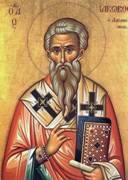The Beginnings: Council of Jerusalem
WEEK 3: COUNCIL OF JERUSALEM
- The Controversy
Review the discussion of Jews and Gentiles. Read Genesis 17:1-13. How did God express His covenant with the Jewish people – with what act? Jesus Himself was circumcised on His 8th day. The act of circumcision, of little importance today, was of great importance to the Jews; it set them apart from the other peoples. Anyone who wanted to become Jewish would, according to verse 13, have to be circumcised. But, should this include those who embraced Christianity? Why or why not? Would Christianity be a continuation of Judaism, open only to Jews (either by birth of by circumcision), or was it an entirely new religion, open to all peoples without the need to become Jewish first?
 The Council Itself
The Council Itself
Read the story in Acts 15:1-35. This was the earliest of the church councils. Who were the major apostles attending? (Peter and Paul) We will be studying St. Paul in the next unit. He had already traveled over much of the Greek world, baptizing Gentiles, and had returned to Jerusalem because of this controversy. Who presided? (James, not the disciple but a relative of Jesus) He was bishop of Jerusalem. Who made the decision? This decision, coming from a pious, orthodox Jew, with a bit of compromise, was acceptable to all the church and opened the church fully to non-Jews, once and for all. How was this decision communicated to the rest of the Church?
- The Decision-making Process
How are decisions to be made? First discuss various options; how is it done in your homes. There is probably quite a lot of variation here. The autocratic father? The true democracy? The loudest gets his way? The most important gets his way? The Council of Jerusalem set a precedent for decision-making in the Orthodox Church that has held for centuries. Look at the process: famous apostles (with strong opinions) from all over the world convene in a central location, called by the bishops of the Church. Decision made by consensus, with the presiding bishop stating the decision in written form. Couriers, not the involved apostles, carrying the decision to far-flung believers. Watch later Church councils. Do they follow this pattern? Compare and contrast it with other methods of decision-making discussed above.
- Play a learning game: 20 Questions. Write the names Peter, Paul, James, Silas on four slips of paper. Students choose a slip. Then the other students ask “yes” or “no” questions (up to 20) to identify the character.
- Primstav: Add St. James on October 23 and St. Silas on July 30. What symbols will you choose for each?
- Close with prayer.